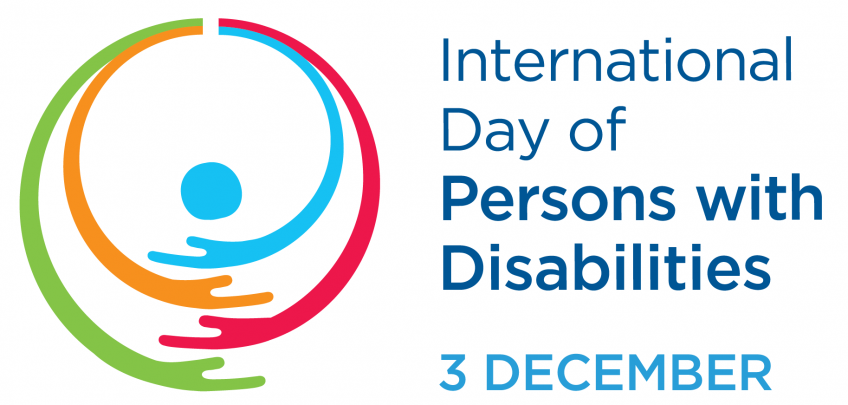International Day of Persons with Disabilities
Posted in: Days of Observance, Video
International Day of Persons with Disabilities is observed annually on December 3. We’re taking this opportunity to highlight the work of Rose Abou Elias. Rose connected with Anera years ago when she joined our youth sports programs, first as a participant and later as a trainer.
Now she’s continuing this tradition and giving back through Chabibeh Club, a youth sports organization, and through her work with a local NGO, arcenciel, supporting marginalized communities in Lebanon, and Cirquenciel, a circus with an inclusive social mission. Watch our interview with this inspiring young person.
Forging an inclusive future for all
The theme established by the United Nations for this year is “Leadership and participation of persons with disabilities toward an inclusive, accessible and sustainable post-COVID-19 world.”
Most of us are close to someone with a disability, or have a disability ourselves. Worldwide, more than one billion people, some 15% of the global population, live with a disability. And 46% of older people live with disabilities.
Living with disabilities often presents challenges in the best of times. In difficult circumstances, these challenges can become even more stark. The UN reports that persons with disabilities are among the hardest hit by COVID-19, for instance.
Lacking access to a formal social safety net, many disabled persons must rely heavily on their families. Anera’s women’s empowerment programs in Palestine work with women in precarious circumstances to establish small enterprises that generate revenue, and often include women supporting family members with disabilities.
Empowering Palestinian Youth and Children | In 2009, Anera reached out to another organization in Beit Jala to help empower the disabled. Through its in-kind program, Anera delivered 80 wheelchairs to Life Gate, an organization that helps physically disabled, deaf and mute children and youth become productive members of society. The organization offers social, physical and occupational therapy, medical care and various training workshops.
Anera’s work supporting persons with disabilities in Palestine goes back many decades. In 1972, Anera began supporting Four Homes of Mercy, near Jerusalem, an organization helping people with disabilities, orphans, the aged and others in need of different kinds of assistance. Anera’s grants supported nurse training and other programs that provided youth with life skills.
In Lebanon, Anera recently launched a virtual sports exchange program program involving youths from American and Lebanese backgrounds, and Syrian and Palestinian refugees, and young people with disabilities.
For many years Anera also ran a scholarship program supporting educational institutions like Al Kafaat Foundation in Lebanon. For over six decades, Al Kafaat has delivered vital educational and rehabilitation services to people who have disabilities across Lebanon.
In Jordan, too, over the years, Anera has supported organizations like the Holy Land Institute of the Deaf working with people with disabilities. Our scholarship program worked to help children with disabilities participate meaningfully in their families and communities.
Improving Palestinian infrastructure for people with disabilities
Making Palestinian schools accessible | When Omar moved from a specialized school to a mainstream school, he initially worried that it would be an unpleasant experience. He was used to interacting mainly with other fellow blind students and adults.
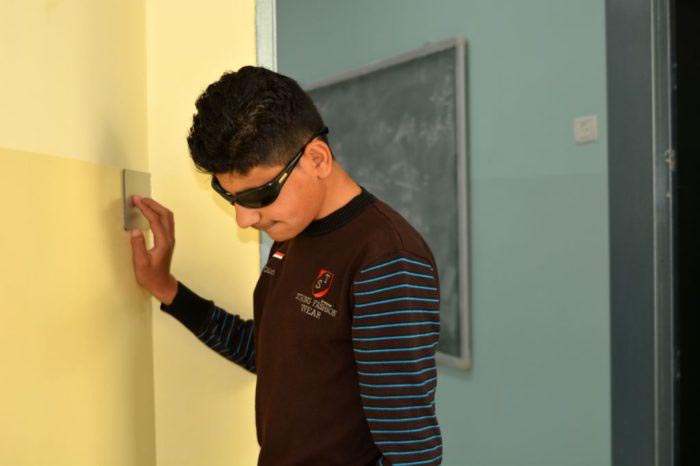

“I was too shy to ask for help. When people did help me, I sensed it was because they felt bad for me.”
Fortunately, Anera had outfitted his new school with accessibility features, as we do at all schools we build. He was surprised to learn that his new school has Braille signage and handicap rails to help him get around.
“There is nothing wrong with being blind – it’s nothing to be ashamed of. I’m blind, so what? I can still do a lot of things despite what many people may think.”
Anera has also built or refurbished a number of Palestinian parks, like the modern and accessible park in the small community of Um Salamuna. The park is fully accessible, ensuring that children and adults with disabilities can join in the fun along with everybody else.
Anera’s work also encompasses projects aimed at improving public health infrastructure and services. For many years, Anera has partnered with the Bethlehem Arab Society for Rehabilitation which helps people with physical, intellectual, or sensory disabilities. For over two decades, Anera has provided dozens of wheelchairs, hearing aids and other supplies including medicines and disposables to the organization. The partnership continues to this day, with medical supplies and other aid.
In 2012, Al Amal Hospital in Khan Younis, Gaza, was deteriorating and and badly in need of upgrades. With funding from USAID, Anera completely renovated the building, which provides vital health care services – like physical therapy for people with disabilities – to more than 8,000 area residents. Anera donors have continued to support the hospital with medical aid and donations of medicines. Patients struggling to make ends meet in one of the world’s most depressed economies are therefore able to get medicine free-of-charge.
Access to wheelchairs and other mobility aids in Gaza
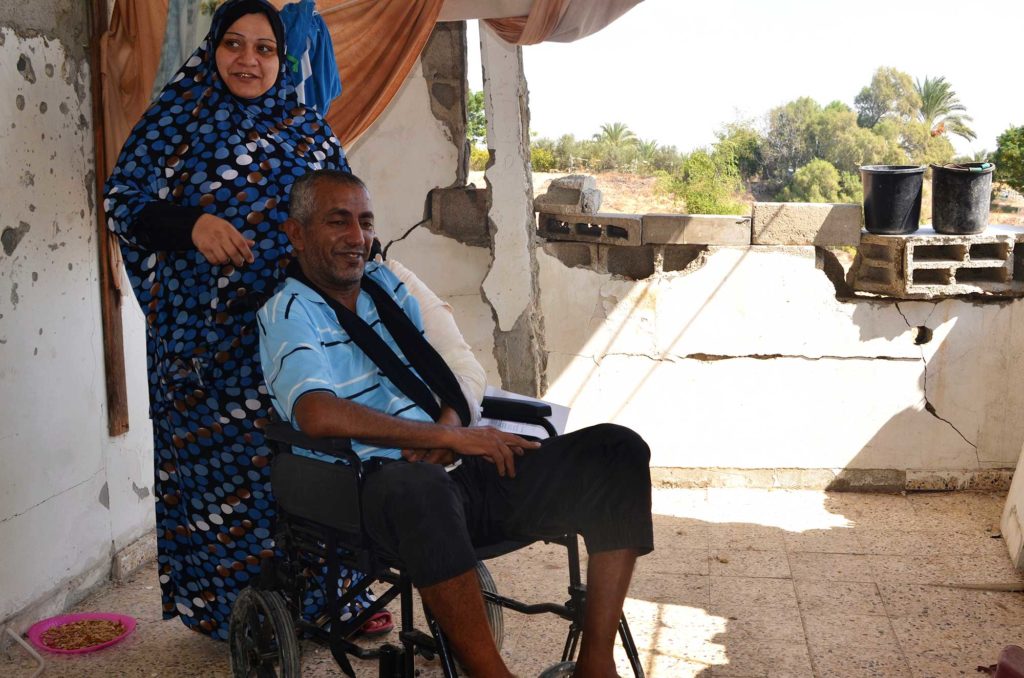

Life for people with disabilities can be especially challenging in a place like Gaza. After Fathi was injured in a car accident, he lay on his bed for months. He had no way to move about.
Donations of mobility aids from partners like Wheels to Heel help people regain some independence and freedom of movement.
Now Fathi has a wheelchair, thanks to our program to distribute shipments of donated wheelchairs through local community organizations.
One of these local groups and longstanding Anera partners is the Right to Live Society in eastern Gaza. The nonprofit provides a nurturing learning environment to children with Down Syndrome and autism. In 2010, Anera has installed a new play space for the children at this center, designed and constructed locally with raw materials that came from recycled metals available inside of Gaza.
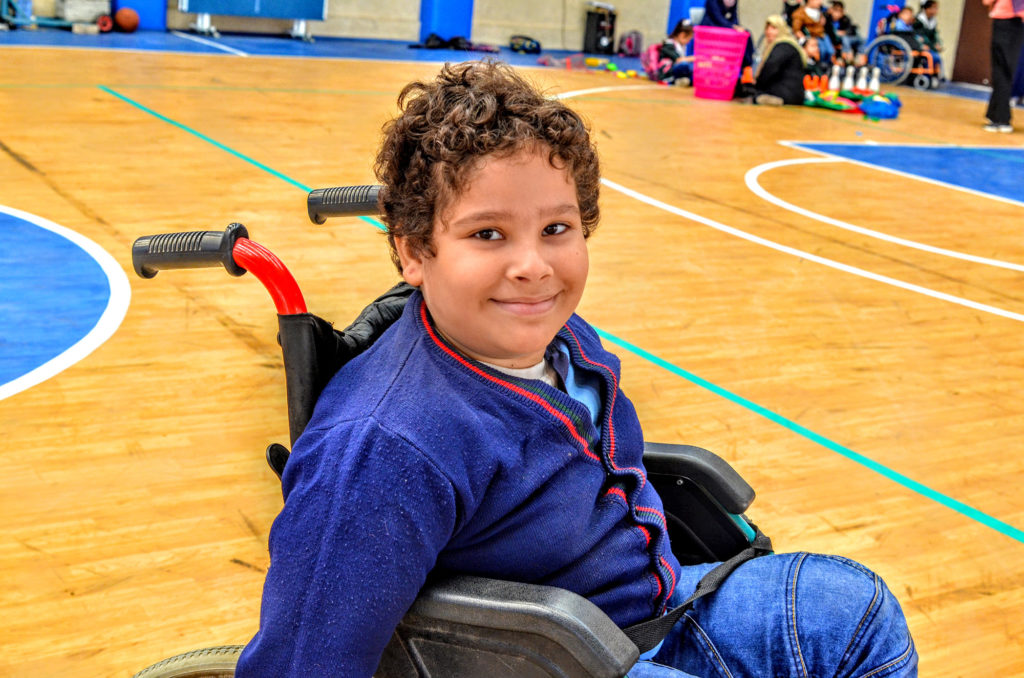

Abed is a kid in Gaza who loves basketball. It’s an activity many kids his age would take for granted. But for Abed, playing his favorite sport was impossible — until he got his new wheelchair.
Wheelchairs, crutches and walkers donated to local nonprofits, like the Society of the Physically Disabled, and hospitals and clinics in Gaza have brought a new sense of mobility and freedom to disabled children in Gaza like Abed.
“Before I got my new wheelchair, my life was pretty boring. I had nothing to do.”
— Abed
Mahmoud, who has lived most of his life with paralysis resulting from childhood polio, is also grateful for the society’s care. He describes the society as the only refuge where he can find personalized medical care. Mahmoud deplores conditions for disabled persons in Gaza. “We are falling through the cracks. No jobs are available to us.”
Responding during emergencies
When thousands of people were injured by sniper fire in the 2018 demonstrations along the de facto border between Gaza and Israel, Anera responded through its medical aid program. Many patients were left wheelchair–bound and will need ongoing care for the rest of their lives. In the context of Gaza’s limited medical resources, international medical aid was crucial to ensuring patients had access to essential devices like wheelchairs.
Dr. Tareq Hafeni, head of the physiotherapy department at Al Amal Hospital described the dire situation his patients found themselves in.
“Most of my patients are still going through a denial stage. It aches my heart when they wake up from a coma only to realize that they can’t afford medicine or aid devices like wheelchairs and crutches.”
Mobility devices are vital in Lebanon too
Shipment of donated mobility devices also play a crucial role in Lebanon in allowing refugees and other marginalized people with physical disabilities to live with greater independence.
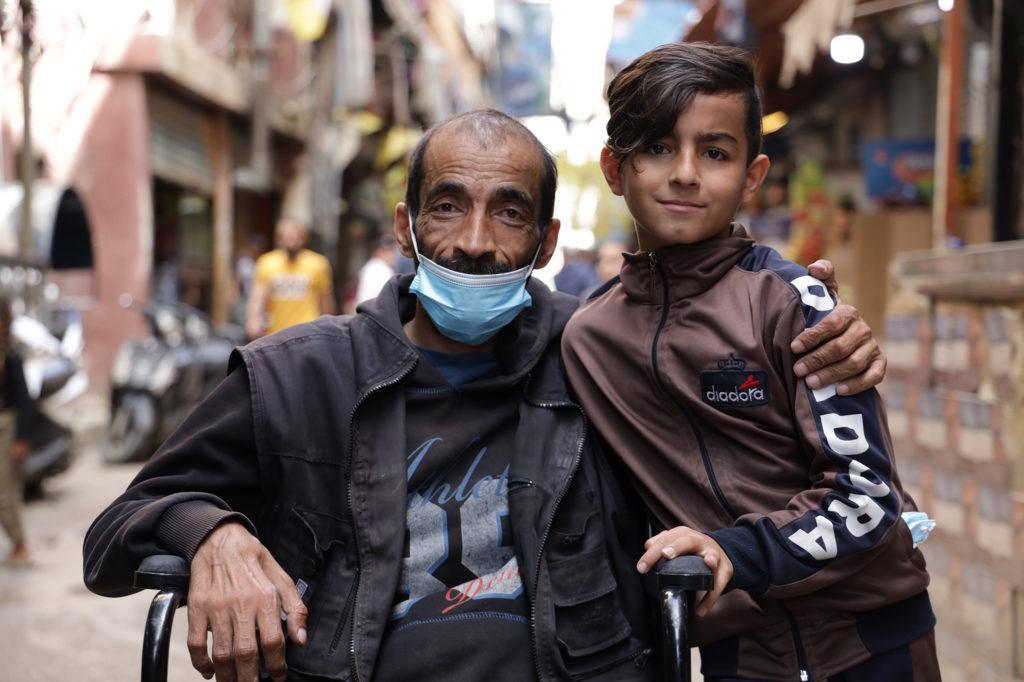

Fatima, a young woman in southern Lebanon, was stuck with a painfully uncomfortable wheelchair until she received this upcycled chair from Wheels to Heal and Anera.
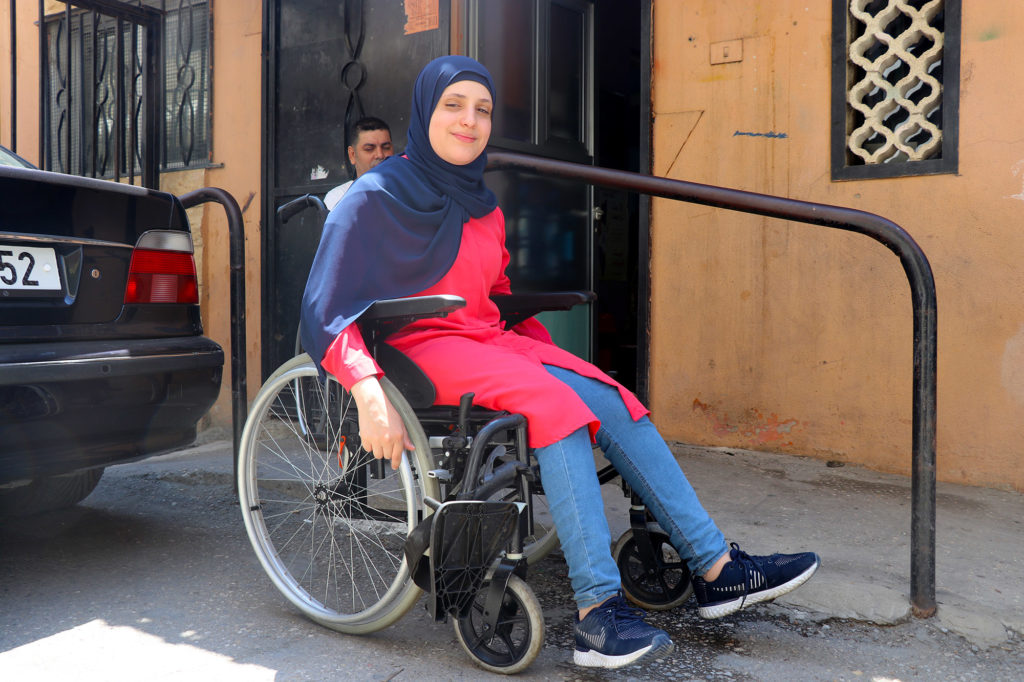

“It is so nice to feel comfortable in your own chair!”
— Fatima
Ismael received a refurbished wheelchair in the same shipment.
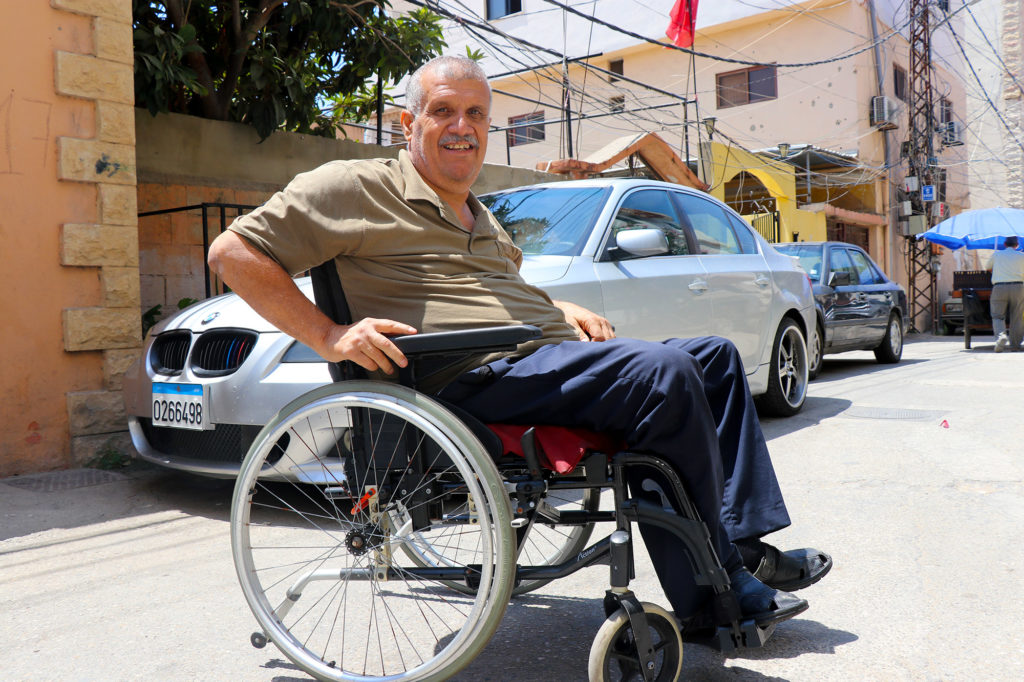

“The hardest thing for someone who is paraplegic is learning a new way of doing things.”
— Ismael
Disability and poverty
According to UNICEF, poverty in Lebanon is “strongly correlated with gender, age and disability.” In 2020, UNHCR estimated 84% of refugees with a disability in Lebanon were experiencing food insecurity. And that was before the full impact of the country’s economic collapse. Many of these individuals are dependent on local charitable organizations for aid.
Palestinian refugees with disabilities face special difficulties due to their refugee status and their disability. Refugees with disabilities, like all refugees in Lebanon, are not given access to national health services and so must resort to non-governmental organizations to access most healthcare. The cooperative work between local and international organizations has been crucial in helping vulnerable communities.
A study by the University of Beirut and UNRWA found that when a Palestinian family lives in extreme poverty, they are twice as likely to have a family member with some form of disability. These families are also much more likely to have a member with a chronic illness. It’s a terrible cycle. Poor housing and bad sanitation lead to sickness and ill health, which creates a financial drain on families, which plunges them even deeper into poverty, and the cycle repeats.
More than a quarter of Syrian refugees live in northern Lebanon, where Anera has been working with 37 local grassroots organizations to build capacity as they address refugees’ needs in education, job training and more. One of Anera’s partners is the Social Skills Rehabilitation Association, established in Bhannine in 2007. The five young women who founded it had three main goals: to promote quality education, to assist people with disabilities, and to improve the status of women.
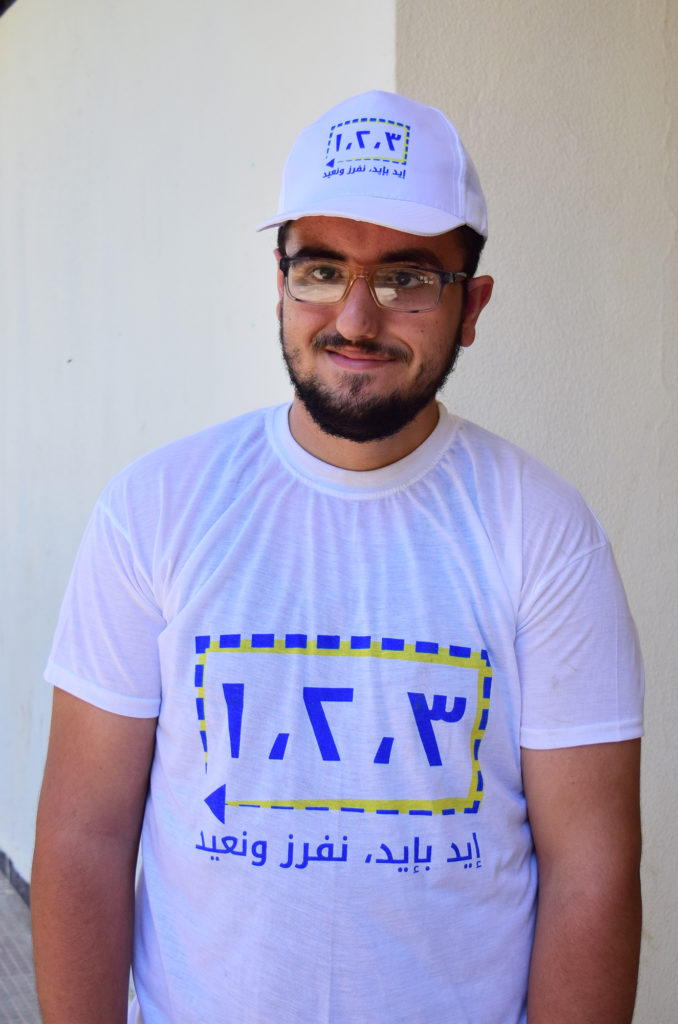

In northern Lebanon’s Nahr El Bared Palestinian Refugee Camp, Mohammad is an inspiring example of community engagement. He’s involved with a local organization that aims to empower youth with special needs. Mohammad is a key member of the team and also takes part in an environmental and health awareness initiative under Anera’s waste management program.
The initiative includes interactive awareness sessions for students which focus on sorting, reducing and reusing waste, as well as youth clean-up campaigns which take place in schools, kindergartens and playgrounds across Nahr El Bared. Ten young men and women volunteered with the initiative, four of whom had disabilities similar to Mohammad.
“I’ve been a part of several activities for people with disabilities, but this is the first time I got the chance to do something for the environment,” says Mohammad.
“I feel so proud to have taken part, especially since it has had such a positive effect on the whole community, and its overall results are sustainable.”
Similarly, Palestinian refugee students with special needs have no public right to special accommodations, and must obtain assistance from educational humanitarian groups.
Anera’s innovative non-formal education program is tailored to the critical needs of an under-served target group of more than 11,000 youth, including Syrian, Palestinian and Lebanese boys and girls between 14-18 years of age. Adnan was a student in this program.
Under Anera’s supervision, Adnan took courses in photography, which gave him marketable skills.
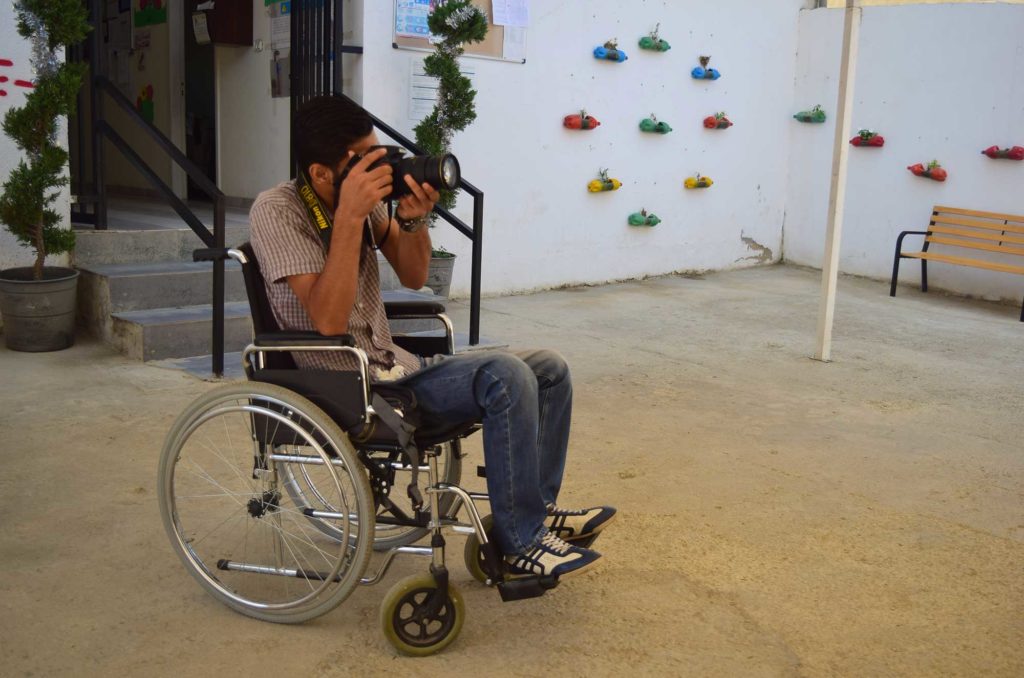

The best part of the program, Adnan says, is how it accommodates people with disabilities. “The centers are equipped with elevators and classes are organized on the ground floor, where students in wheelchairs don’t have to climb the stairs.”
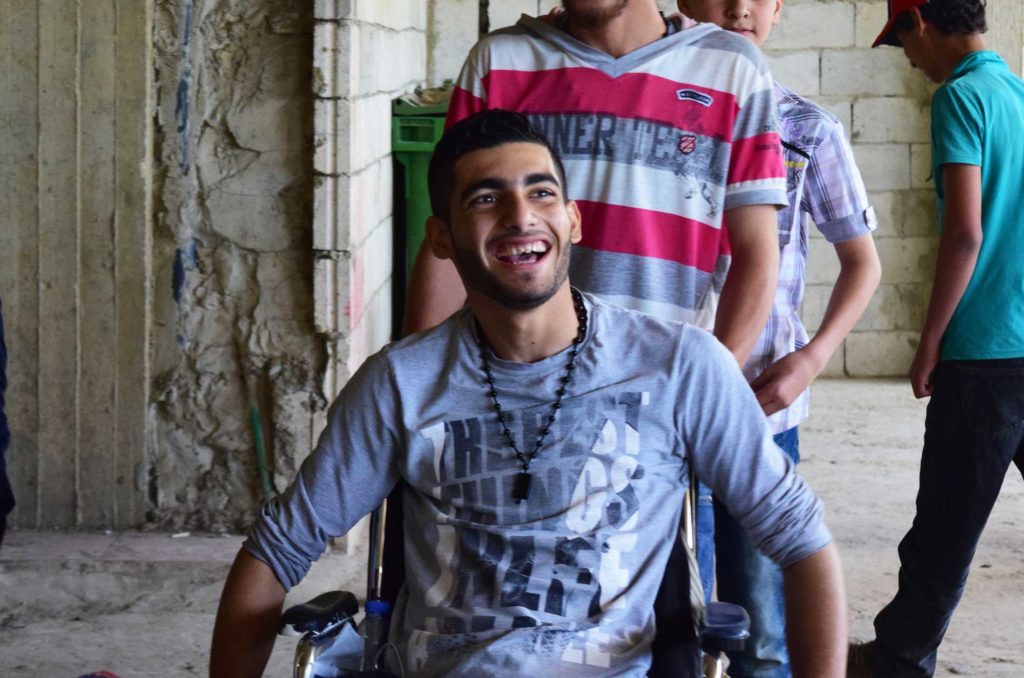

OUR BLOG
Related
Part of a series on the impact of the war on all sectors of economic life within Gaza, Anera’s immediate response and plans for the future. Other posts cover housing, education, WASH, health and food production systems. Livelihood Recovery In Gaza, 57 years of occupation and…
InterAction and 50 Member CEOs, some of whom have organizations that work in Gaza, urge President Biden to take decisive and actionable steps to alleviate the humanitarian crisis in Gaza. Detailed within this letter are specific steps and commitments that…

